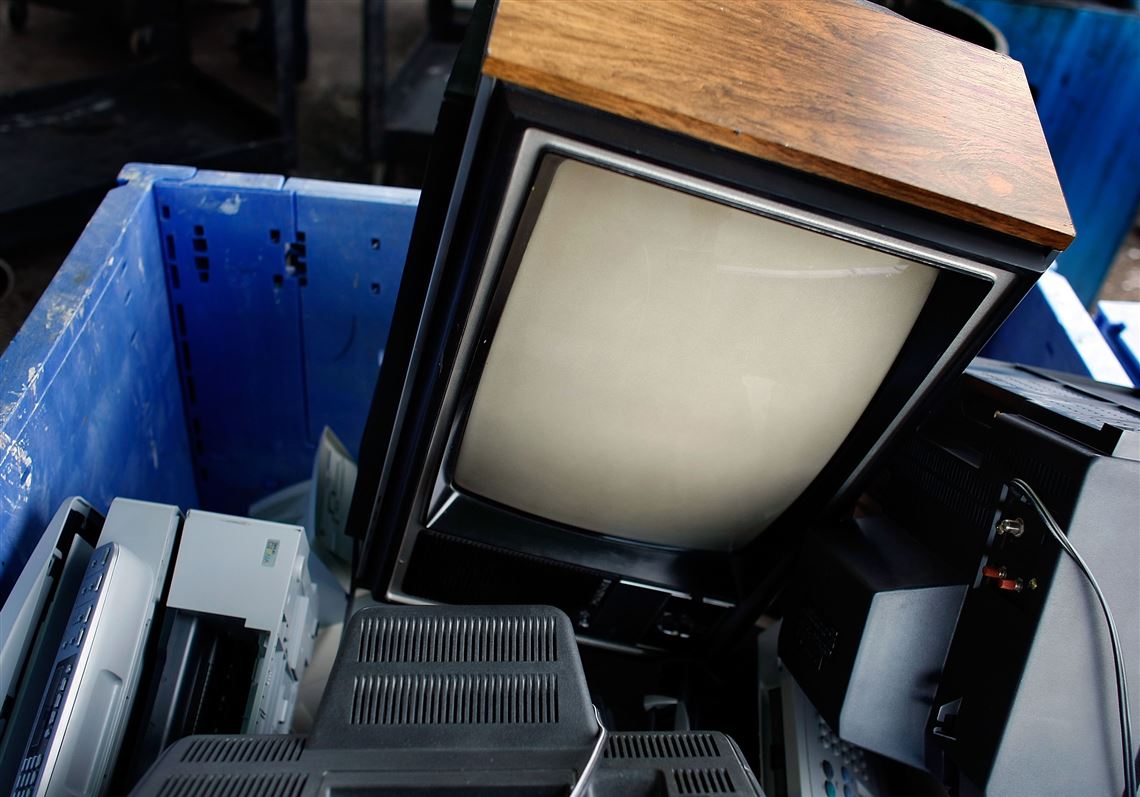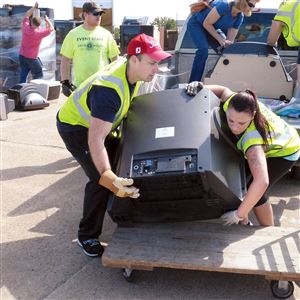At its most recent hard-to-recycle collection event in April, the Pennsylvania Resources Council took in 110,000 pounds of electronics in four hours. The bulk of that was TV sets, which went to eLOOP, a recycler in Plum.
eLOOP started business in 2008 taking 35,000 pounds of covered electronic devices. Last year, it took in almost 12 million pounds, mostly TVs, which have a negative value to recyclers.
The tonnage of TV waste is far outpacing the capacity to recycle it, said Justin Stockdale, western regional director of the council. At the same time, Pennsylvania has only eight recycling companies certified to accept TVs for rebates from electronics manufacturers.
Mr. Stockdale and eLOOP’s President Ned Eldridge are calling for revisions to the state’s 2011 Pennsylvania Covered Device Recycling Act. They say the law is a sieve because it allows electronics manufacturers to set the duty for the recycling of their products below the true cost to recyclers.
They also have urged Allegheny County officials to find a permanent collection site to be open most days to provide convenience most consumers need to dispose of their electronic waste responsibly.
Demand has been growing for all hard-to-recycle drop-off events, which are held in various locales several times each year, but not even 1 percent of the area’s population participates, Mr. Stockdale said.
Construction Junction, a nonprofit that sells used household and construction items, was one of eLoop’s suppliers but will stop accepting electronic waste as of the end of June. Its executive director, Mike Gable, said the risk of injury to employees and the cost led to his decision, “which gives us pangs of guilt. But we’re getting inundated.”
Best Buy stores accept televisions as long as they are not consoles, the screens are less than 32 inches and they have no cracks. But the council regularly gets dozens of larger console televisions each time it holds collection events.
Amie Downs, spokesman for Allegheny County Executive Rich Fitzgerald, said the county and its agencies are discussing a solution with Mr. Stockdale, Mr. Eldridge and Mr. Gable.
“A permanent site is one of the conversations,” she said, “but it depends on funding.”
If you think television is full of worthless fodder when it functions, it’s worse when it dies. The cathode ray tube and the glass contain lead. Fewer and fewer CRT TVs are available for purchase and are being discarded in favor of flat-screen TVs.
“Flat screens will be their own problem,” Mr. Eldridge said, “but we’re swamped by the problem of the day.”
Twenty-five states have legislation prohibiting electronic waste from going into landfills. California was the first in 2003. Its consumers pay a recycling fee when they buy a product.
Pennsylvania’s Covered Device Recycling Act was intended to put the onus on electronics manufacturers by charging them a duty. The law ended curbside pick-up of TVs by municipalities and established an account to distribute these duties to recyclers.
But manufacturers are not required to pay the full cost. Wording in the law allows them to set the amount based on weight and sales.
“That’s a flaw,” said Mr. Eldridge, whose company makes up for its losses from handling TVs with contracts to destroy corporate data and refurbishing reusable electronics equipment for resale. “Ground-up costing should be done by recyclers to tell manufacturers what it costs.”
The insufficient payments cause further strain when the market for commodities harvested from more lucrative waste, such as palladium, gold, silver and copper, goes flat.
“It’s true that the [original electronic manufacturers] set the amounts and not the people who know the cost,” said Amanda Witman, a spokeswoman for the state Department of Environmental Protection. “The act does not establish a funding formula for the collection of the materials.”
“Corporate interests contradict the public welfare,” Mr. Stockdale said. “Which is why we end up with TVs on sidewalks.”
Some think the state law should require all permitted electronics recyclers to take TVs, but Mr. Eldridge said many don’t have the capacity to absorb the losses or pay the costs of certification standards.
Certification includes oversight by the globally rigorous Basel Action Network and the Institute of Scrap Recycling. Certified recyclers also pay “a heavy amount of liability insurance, workmen’s comp and for emissions” control, Mr. Eldridge said. “I pay $25,000 a year to keep certified.”
The resources council has collected 582 tons of e-waste in the 12 years it has held hard-to-recycle events, Mr. Stockdale said. “Since 2012, it has been 90 percent televisions.”
Construction Junction has collected electronic waste for five years. The used-construction supply store in North Point Breeze was established by the Pennsylvania Resources Council, and their relationship as eco-stewards made for the organization’s natural segue into that service.
But Construction Junction is a victim of the domino effect caused by insufficient duties from manufacturers; as eLOOP’s rebates come in under the recycling cost, so do the rebates it can offer its network of collectors.
“Pennsylvania is one of about five states whose laws cause recyclers to bear the brunt of the expense,” Mr. Eldridge said. “But I told my network to stick with me; I will work to make this law better.”
Diana Nelson Jones: djones@post-gazette.com or 412-263-1626.
First Published: May 19, 2015, 4:00 a.m.

















